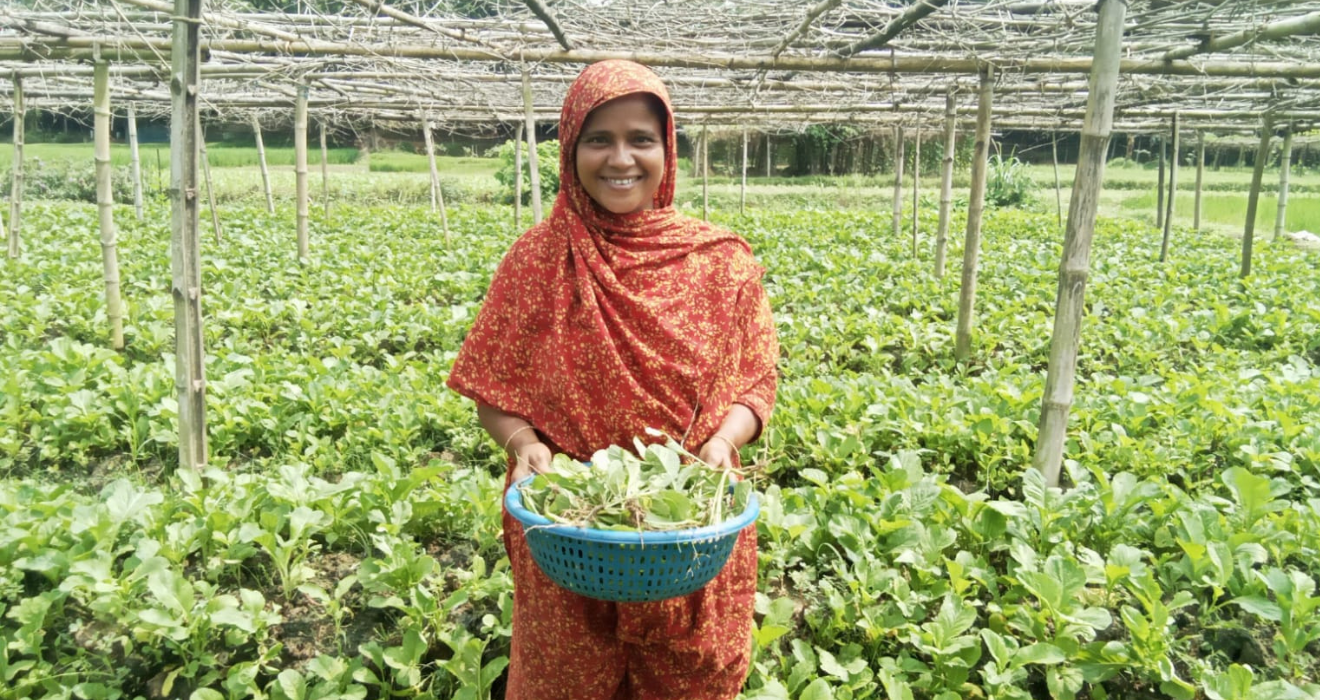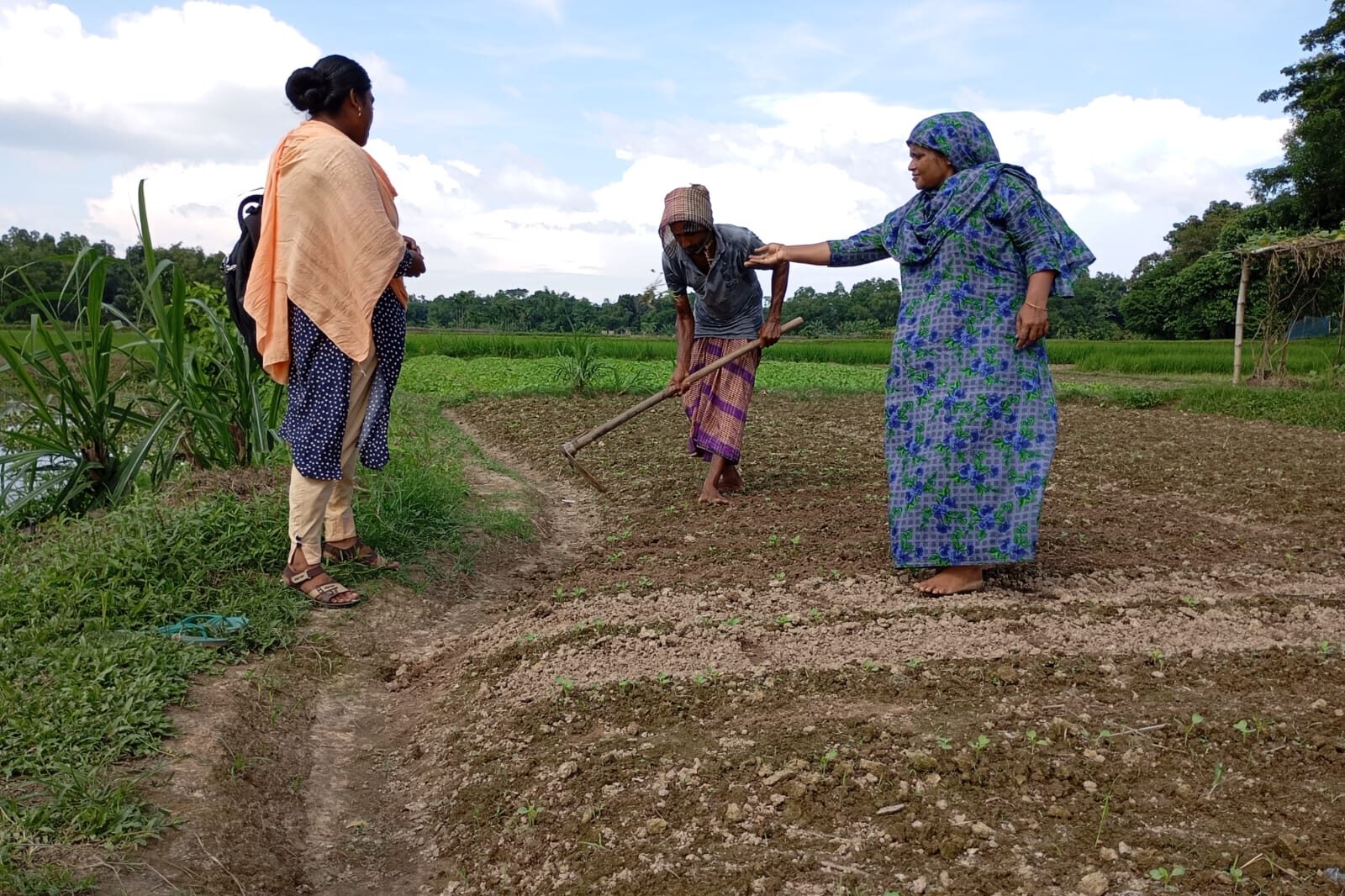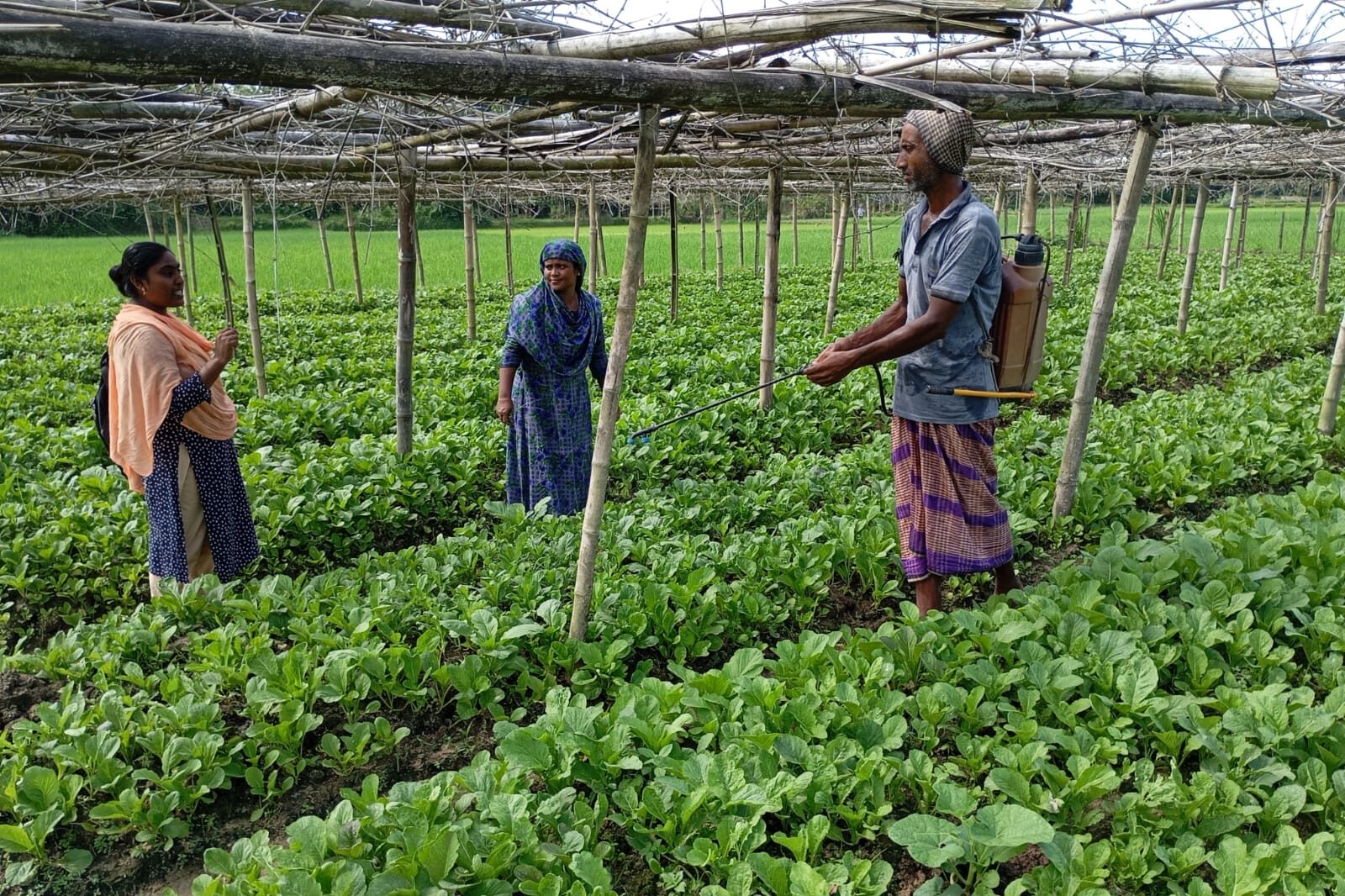Extraordinary Woman: Meet Rozina
When catastrophic floods ravaged Bangladesh, Rozina's farm was washed away. Amid despair, she persevered and sparked a wave of inspiration among her neighbors to rebuild. Read her Extraordinary story.

BY Md. Saleh Hasan Adnan, Apun Sarkar, and Ataur Rahman
This story is the fourth of five in our Extraordinary Women series. Learn more about this campaign and help raise $1 million for Extraordinary Women.
Meet Rozina, a mother of two from Bagrihal Village, Kulaura Upazila in northeastern Bangladesh. She joined an agriculture and poultry farming enterprise through BRAC’s Ultra-Poor Graduation program. This program, developed by BRAC and scaled through the world, is considered one of the most effective at helping women graduate from extreme poverty. Rozina began the two-year program just before terrifyingly destructive floods struck Bangladesh in late August.
Rozina’s farm had been thriving with leafy greens and vegetables. But then, heavy rains arrived, breaking a protective dam upstream on the Manu river. Floodwaters rose… and stayed for days.
“On the night of August 22, a deep fear gripped me as I watched water engulf the area around my home,” Rozina remembers. “The darkness was shattered by the screams of neighbors, making it clear the floodwaters were rising fast.”
In the morning, Rozina assessed her farm. “I saw that everything—our fields of eggplants, bitter melons, gourds, and red spinach—was submerged,” she says.
Caught off guard by flooding of this magnitude, her family was scared and didn’t know what to do next. “My children, Jamina and Sohan, cried, asking how we would survive,” Rozina says. “I felt utterly helpless; the water had come so suddenly. In all my 12 years of marriage, this was only the second time our home had flooded. We hadn’t prepared for it.”
A week later, the floodwaters finally receded, and Rozina took in the devastation of her farm. She recalls, “The trellises for my gourds had floated away, crops lay rotting, and all seemed lost.”
The roads to the BRAC school that Rozina’s children attend were blocked by flood damage, so they couldn’t go to school. They were heartbroken.
Severe flooding wiped out Rozina’s farm, but she refused to give up. She replanted climate-resilient, high-demand crops. In the process, she inspired her community to start farming, too.
But Rozina didn’t abandon hope. She sought advice from BRAC and her local agricultural office, determined to grow crops that would bring quick returns. “It was Panna apa [a staff member] from BRAC who gave me the courage to start anew,” she shares. “I replanted gourds, radish greens, eggplant, red spinach, and bitter melons—each chosen carefully to meet local demand.”
 Devastating flooding in Bangladesh destroyed Rozina’s farm. But she adapted quickly and replanted.
Devastating flooding in Bangladesh destroyed Rozina’s farm. But she adapted quickly and replanted.
Rebuilding and replanting her farm with these high-demand crops was hard work. “Pulling back the trellises from the water and reconstructing them felt like a small triumph,” Rozina reflects.
Guided by BRAC staff, she made the switch to eco-friendly and organic farming techniques. She started using pheromone traps to catch crop-hungry pests, and worm composting instead of chemical fertilizers. Rozina also leaned on BRAC for psychosocial support when her spirits were low or she felt overwhelmed.
Slowly, her fields began to thrive once again. Something unexpected happened, too. “Seeing my efforts blooming vividly, others in the community started farming in their own yards,” Rozina says.
With income from her harvests, Rozina can afford her children’s school fees and save for their futures. “My children are smiling again. The joy of going back to school and having proper meals has restored peace in our home.”
Rozina decided to diversify her income by growing papaya, lemon trees, and chili near her home. She’s also planning further growth for her farm. “I plan to keep expanding my farm by leasing additional land and save enough to buy cows and goats,” Rozina says.
 Rozina’s determination and adaptability to new farming techniques are yielding great results! Her farm has recovered and is even more fruitful than before the flooding.
Rozina’s determination and adaptability to new farming techniques are yielding great results! Her farm has recovered and is even more fruitful than before the flooding.
An unfortunate reality of climate change, Rozina is preparing for inevitable future floods. “Beyond farming, I’ve learned how to adapt to this new reality,” she says. “I’ve started to raise beds in my fields, and one day, I’ll turn our mud house into a brick one.”
Rozina concludes, “As life gradually returns to normal, I am filled with hope. With every small step, I feel stronger, knowing I’m building resilience not only for myself, but also for my family and community.”
Around the world, people living in poverty are most vulnerable to the effects of climate change. Increasingly extreme and erratic weather events such as flooding, heat waves, and cyclones affect food security, nutrition, and livelihoods—which ultimately deepens poverty.
BRAC trains farmers to build resilience to climate change by yielding more from their existing fields and planting disease-resistant seeds. Since 2012, almost 1 million farmers have learned about sustainable farming—the majority of whom are women.
Graduation participants like Rozina gain the tools to not only get out of poverty, but to stay out of it. While a house can always be washed away, nothing can wash away knowledge, skills and confidence.
You can bring these knowledge, skills, and confidence to more women so that every community and every family has tools to adapt to climate change and thrive. Make a gift today to support more Extraordinary Women like Rozina as they lift themselves, their families, and their communities out of poverty.
This story was contributed to by Md. Saleh Hasan Adnan, Manager for Brand and Network Management Communications, BRAC; Apun Sarkar, Communications, BRAC, and Ataur Rahman, Ultra-Poor Graduation Program, BRAC.